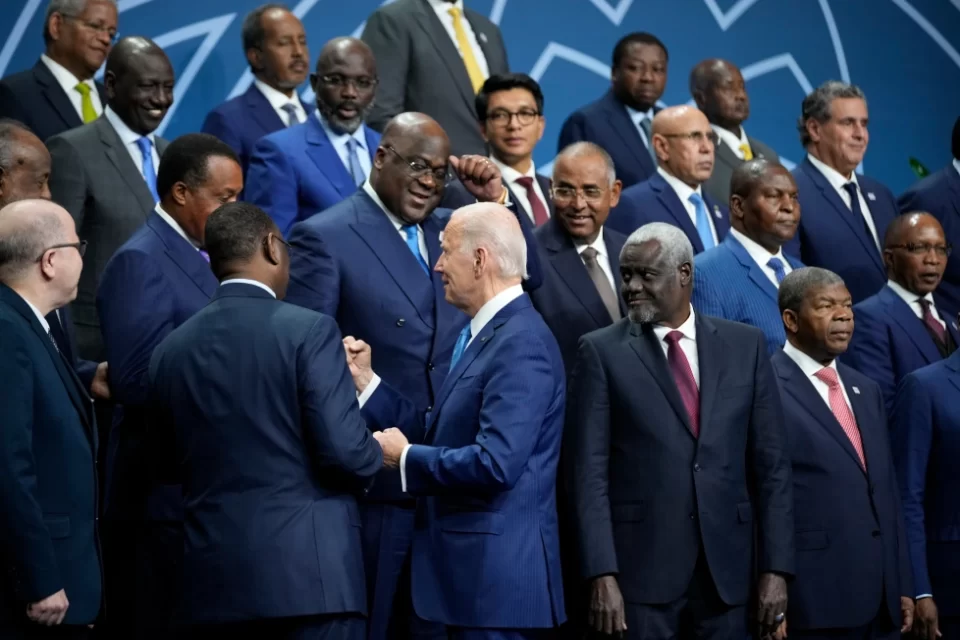The three-day US-Africa Leaders’ Summit ended Thursday in Washington DC with President Joe Biden dangling his country’s plans to deliver $55 billion in assistance to…
The three-day US-Africa Leaders’ Summit ended Thursday in Washington DC with President Joe Biden dangling his country’s plans to deliver $55 billion in assistance to the continent. The planned assistance is a grand gesture that observers of Africa are only too familiar with. As usual, they are no more than big promises to the summiteers of 49 African heads of state and the head of the African Union (AU). Also at the summit were the quieter diplomacy, including pull-asides between US top officials and leaders of Ethiopia, Congo, Angola and Senegal, whose president, Macky Sall, is the chairperson of AU.
Biden also hosted leaders of Nigeria, Congo, Gabon, Liberia, Madagascar and Sierra Leone to a private meeting on Wednesday where they discussed their upcoming elections during what the White House says is a “critical time for democracy globally.” Publicly, Biden affirmed support for more African representation at the G-20 and the UN Security Council.
Generally, the summit reaffirmed that African leadership is critical to confronting today’s defining global challenges including peace and security, climate change and democratic governance. Canvassing for balanced and comprehensive whole-of-government approach, the summit agreed to develop African partners’ military capabilities; support peacekeeping efforts; advance women, peace and security objectives; increase African institutional capacity; promote gender equality, human rights, and the rule of law; empower civil society; strengthen accountability mechanisms; and support democratic transitions and institutions.
Biden’s outreach attempt was seen by many as a way of limiting the power of China, which has invested more in Africa than any other nation. Beijing has held its own high-level meetings with African leaders every three years for over two decades. Indeed, under the aegis of the Forum on China-Africa Cooperation (FOCAC), Chinese and African leaders last met at a summit in 2021. Nor is the US-Africa Leaders’ Summit the first such event focused on Africa. Last February, 55 African Union (AU) Heads of State and Government and their delegations convened in Brussels for the 6th summit with the 27 European Union (EU) nations.
The AU has also held summits with Japan and Turkey. In May 2021, France hosted the African Finance Summit attended by 17 African and four European leaders and heads of international organisations. The first Russia-Africa Summit was held on 23–24 October 2019 in Sochi, Russia and the second, billed for this year truncated by the war with Ukraine. Canada was not left out with The Africa Forum Canada 2022 held August 31, 2022 to September 2, 2022. The India–Africa Forum Summit (IAFS) is held once in every three years as the official platform for African-Indian relations.
Ordinarily, these summits are welcome as they help set up priorities, especially in the area of trade and investment targets.
This summit, just like the others before it, should bring substance and not just photo opportunities. But the drawback is that while the hosts know exactly what they want out of each summit, for Africans, it looks like a jamboree as they go there empty handed, with nothing to offer but readily available to receive crumbs.
Africans at home are therefore left wondering what exactly is the point of these summits year in, year out. As the Rwandan President, Paul Kagame, said of the recent summits, African leaders do not need to be invited for summits outside of the continent to address the continent’s problems. Instead, he said, African leaders should first invite “ourselves to come together to tell each other the actual truth we must tell each other about our serious problems.”
We share Kagame’s view, even if we wish he practices more of what he preaches. But the reality is that what Africa needs is not more summits with American, European or other leaders but action at home. The tasks are clear: transform African economies from subsistence to commercial agriculture, to build a solid local industrial and technological bases at home, to build pan-African infrastructure in road, rail and air transport networks, to strengthen the institutions of African integration like the AU, the African Development Bank, sub-regional bodies and multilateral instruments to address persistent poverty, growing unemployment, widening inequality, wars, conflicts and instability.
Each and all of these will require collaboration and partnership with countries and institutions outside of the continent, but the initiative must independently come from African leaders themselves, and right here at home. African leaders ought to realize that tapping the continent’s demographic growth and economic potential and not junketing around global summits is what is needed to help shape the future of Africa. Indeed, the external summits have turned into forums for talking about addressing African problems, rather than actually addressing them through concrete actions.
Citizens of African countries now find these summits embarrassing, and rightly so. The damage done to the reputation of Africa and its leaders in the eyes of the world at such summits far surpasses the paltry monetary gains that follow for Africa, if at all. Therefore, as African leaders prepare for the next summit outside of the continent, we at Daily Trust urge them to drop the begging bowls and get to work here at home.
First published in Daily Trust

